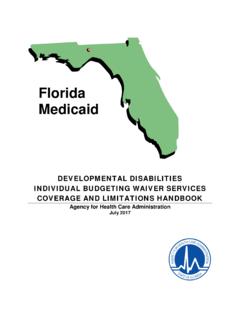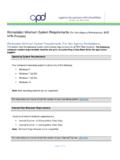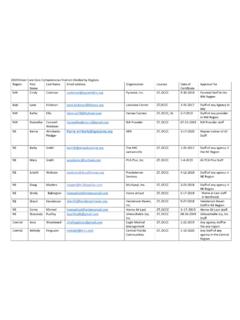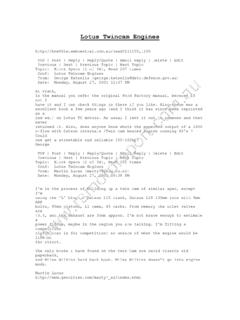Transcription of APPLICATION - APDCares
1 APPLICATION To apply for services from the Agency for Persons with Disabilities (APD), submit an APPLICATION to one of the local APD offices either by mail or in person. The locations of the local APD offices can be found at . The local APD office can assist individuals with the APPLICATION process. The APPLICATION can be found online at and is available in English, Spanish and Haitian/Creole. In order to be eligible for services, an individual must have a developmental disability which occurs prior to age 18. Disabilities served include Intellectual Disability, Autism, Spina Bifida, Cerebral Palsy, Prader-Willi syndrome, Down syndrome, Phelan-McDermid syndrome, or individuals between the ages of 3-5 at high risk for a developmental disability.
2 As part of the APPLICATION process, APD will request proof of a developmental disability diagnoses as describe below. If you have the proof of eligibility that you can provide with your APPLICATION , it will streamline the eligibility review process. Otherwise, APD will assist you in obtaining the information. Documentation of a developmental disability may include, but is not limited to school records, testing, or medical records. Intellectual Disability: Individuals with intellectual disabilities have significantly sub average general intellectual functioning existing concurrently with deficits in adaptive behavior which manifest before the age of 18 and can reasonably be expected to continue indefinitely.
3 This is evidenced by IQ scores below 70, along with severe deficits in adaptive functioning as measured on standardized tests. Intellectual disabilities are determined by licensed psychologists. Autism: Autism means a pervasive, neurologically based developmental disability of extended duration which causes severe learning, communication, and behavior disorders with age of onset during infancy or childhood. Individuals with autism exhibit impairment in reciprocal social interaction, impairment in verbal and nonverbal communication and imaginative ability, and a markedly restricted repertoire of activities and interests. A diagnosis of autism may be made by licensed psychiatrists, psychologists, neurologists, or developmental pediatricians who have specific training and experience in making such diagnosis.
4 Spina Bifida: Individuals with Spina Bifida have a medical diagnosis of spina bifida cystica or myelomeningocele. Diagnosis is confirmed by written documentation from either a medical doctor, doctor of osteopathy, or medical records that document a diagnosis of spina bifida cystica or myelomeningocele before the age of 18. Cerebral Palsy means a group of disabling symptoms of extended duration which results from damage to the developing brain that may occur before, during, or after birth and that results in the loss or impairment of control over voluntary muscles. For the purposes of this definition, cerebral palsy does not include those symptoms or impairments resulting solely from a stroke.
5 Diagnosis is confirmed by written documentation from either a medical doctor, doctor of osteopathy, or other medical records documenting a diagnosis of cerebral palsy before the age of 18. Prader-Willi syndrome: Prader-Willi syndrome means an inherited condition typified by neonatal hypotonia with failure to thrive, hyperphagia or an excessive drive to eat which leads to obesity usually at 18 to 36 months of age, mild to moderate intellectual disability, hypogonadism, short stature, mild facial dysmorphism, and a characteristic neurobehavior. Diagnosis is confirmed by written documentation from either a medical doctor, doctor of osteopathy, medical records that document a diagnosis of Prader-Willi syndrome before the age of 18.
6 Down syndrome: Down syndrome means a disorder caused by the presence of an extra chromosome 21. Evidence under this category requires medical records documenting a chromosome analysis (also referred to as a karyotype) finding the individual has an extra genetic material on their number 21 chromosome. Phelan-McDermid syndrome: Phelan-McDermid syndrome is a rare disability. Children are born with a specific chromosomal abnormality. Although the range and severity of symptoms may vary, Phelan-McDermid syndrome is generally characterized by low muscle tone, absent to severely delayed speech, moderate to profound intellectual disability, minor malformed or misshapen features, symptoms of autism spectrum disorder, motor delays, and epilepsy.
7 High Risk: Individuals considered high risk are children ages 3 to 5 years old with either a developmental delay in cognition, language, or physical development, a child surviving a catastrophic infectious or traumatic illness known to be associated with developmental delay, child with a parent or guardian with developmental disabilities who requires assistance in meeting the child s developmental needs, or a child who has a physical or genetic anomaly associated with developmental disability. SERVICES APD offers a wide range of social, medical, residential, and behavioral services. The following is a list of services offered. Services provided are based on need and coverage criteria, so not all individuals receive all services.
8 Adult Dental Behavior Analysis Behavior Assistant Life Skills Development 1- Companion Life Skills Development 2 Supported Employment Life Skills Development 3 Adult Day Training Therapies: Dietician, Occupational, Speech, Physical, Respiratory, Specialized Mental Health Counseling Environmental Accessibility Adaptations Durable Medical Equipment Consumable Medical Supplies Personal Supports Supported Living Coaching Support Coordination Transportation Nursing Residential Habilitation Respite Special Medical Home Care In-Home Subsidies Family Care Recreation Assessments and Medical Evaluations Support Planning Psychological Evaluations Competency Training Personal Emergency Response Systems















